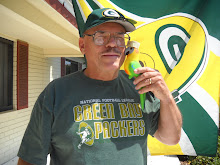My reason for living and I recently returned from a visit up near the Arctic Circle, at a place called Manitowish Waters in Wisconsin. Manitowish Waters consists of a chain of ten lakes, all connected so that one may boat among them unencumbered except by no-wake zones in the connecting channels.
Whenever I went out on a boat, and we passed other boaters, I would call out, "Have ye seen the white whale?" The responses, save one, were liken unto deer caught in the headlights--staring eyes, gaping mouths, clueless countenances. The one who responded verbally asked, "Who are you? Moby Dick?"
After several such shout-outs, one of the people with me on the boat asked, "What is that Moby Dick crap?" At first I suspected he thought I was referring to the male appendage of the little, skinny, bald-headed techno-pop artist who composed the credits-roll music at the end of all four Bourne movies, but after further consideration I doubt if he even made that connection.
His son knew what Moby Dick was. He had read Melville's ponderous tome in high school, from which he was not far removed.
Moby-Dick or the Whale is not an easy read. The plot narrative is interrupted here and there by entire chapters of woefully dated lectures on whaling. Melville thought, for example, that the sperm whale is the largest animal on the planet. He had heard rumors of the blue whale, but he was not convinced it exists.
Ayn Rand's Atlas Shrugged is equally ponderous but for different reasons. Rand belabors her points until her reader screams, "Enough! I get it!" Her attempt to draw readers into her hero, John Galt, becomes tedious. "Who is John Galt?" her characters reply when asked any question to which there is no known answer. You know, like, "Barbra Streisand? What was James Brolin thinking?" "Who is John Galt?"
After she killed her horse and then continued to beat it for much of the book, she has Galt make a chapter-long speech that more or less expounds on her philosophy of objectivism. I skipped almost all of it. You don't need to keep beating me over the head with anything.
Anyway, Atlas Shrugged envisions a time when society's creators and producers finally become fed up with a government that regulates them to the point they can no longer operate their businesses efficiently and profitably, and redistributes their inventions, innovations and wealth to society's moochers. One by one they drop out and disappear, leaving the masses to learn the hard way the dangers and consequences of socialism. Collapse therefore becomes inevitable and necessary to the rebirth of a purely capitalistic economy, nurtured by individuals and bereft of government interference.
Why the sudden resurgence of interest in Ayn Rand? Because Mitt Romney chose as his running mate Paul Ryan, a--for want of a better word--disciple of Rand. In an effort to understand Ryan and convey that understanding to their audiences, the talking heads and newspaper columnists are contrasting (Rand was a vehement atheist and pro-abortion; Ryan is neither) and comparing (Rand staunchly believed in minimal, unobtrusive government and individualism as opposed to collectivism; Ryan does also) the two.
While Moby-Dick may have been a staple on the reading list of most high school English teachers, it's almost a certainty Atlas Shrugged was not. I didn't even come across it until years after I graduated college. If you haven't read it I strongly recommend that you do so. Its engaging storyline and intriguing premise will give you much to think about.
As for its effect on me, well, it pretty much preached to the choir.
Saturday, August 18, 2012
Subscribe to:
Post Comments (Atom)

No comments:
Post a Comment